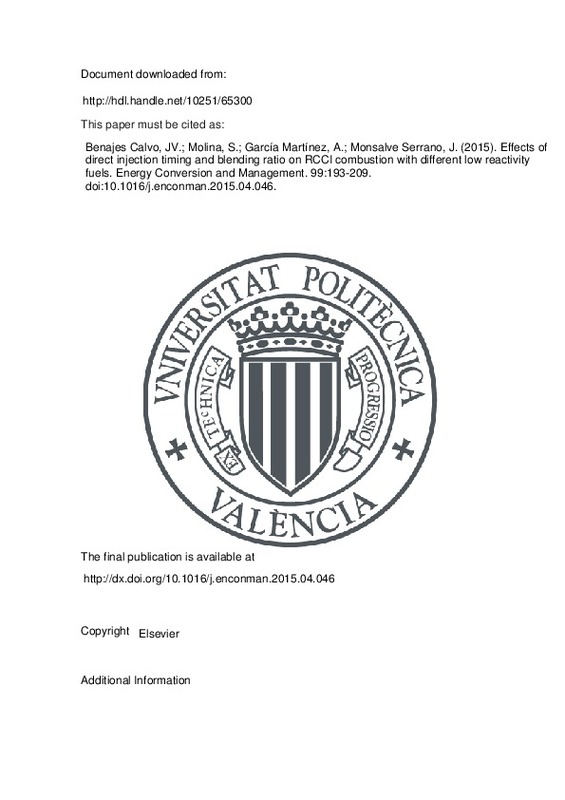JavaScript is disabled for your browser. Some features of this site may not work without it.
Buscar en RiuNet
Listar
Mi cuenta
Estadísticas
Ayuda RiuNet
Admin. UPV
Effects of direct injection timing and blending ratio on RCCI combustion with different low reactivity fuels
Mostrar el registro sencillo del ítem
Ficheros en el ítem
| dc.contributor.author | Benajes Calvo, Jesus Vicente
|
es_ES |
| dc.contributor.author | Molina, Santiago
|
es_ES |
| dc.contributor.author | García Martínez, Antonio
|
es_ES |
| dc.contributor.author | Monsalve Serrano, Javier
|
es_ES |
| dc.date.accessioned | 2016-06-06T10:31:07Z | |
| dc.date.available | 2016-06-06T10:31:07Z | |
| dc.date.issued | 2015-07-15 | |
| dc.identifier.issn | 0196-8904 | |
| dc.identifier.uri | http://hdl.handle.net/10251/65300 | |
| dc.description.abstract | This work investigates the effects of the direct injection timing and blending ratio on RCCI performance and engine-out emissions at different engine loads using four low reactivity fuels: E10-95, E10-98, E20-95 and E85 (port fuel injected) and keeping constant the same high reactivity fuel: diesel B7, (direct injected). The experiments were conducted using a heavy-duty single-cylinder research diesel engine adapted for dual-fuel operation. All the tests were carried out at 1200 rpm. To assess the blending ratio effect, the total energy delivered to the cylinder coming from the low reactivity fuel was kept constant for the different fuel blends investigated by adjusting the low reactivity fuel mass as required in each case. In addition, a detailed analysis of the air/fuel mixing process has been developed by means of a 1-D in-house developed spray model. Results suggest that notable higher diesel amount is required to achieve a stable combustion using E85. This fact leads to higher NOx levels and unacceptable ringing intensity. By contrast, EURO VI NOx and soot levels are fulfilled with E20-95, E10-98 and E10-95. Finally, the higher reactivity of E10-95 results in a significant reduction in CO and HC emissions, mainly at low load. | es_ES |
| dc.description.sponsorship | The authors acknowledge VOLVO Group Trucks Technology and TOTAL for supporting this research. | en_EN |
| dc.language | Inglés | es_ES |
| dc.publisher | Elsevier | es_ES |
| dc.relation.ispartof | Energy Conversion and Management | es_ES |
| dc.rights | Reserva de todos los derechos | es_ES |
| dc.subject | Reactivity Controlled Compression Ignition | es_ES |
| dc.subject | Engine-out emissions | es_ES |
| dc.subject | Mixing process | es_ES |
| dc.subject | Efficiency | es_ES |
| dc.subject | EURO VI | es_ES |
| dc.subject.classification | MAQUINAS Y MOTORES TERMICOS | es_ES |
| dc.title | Effects of direct injection timing and blending ratio on RCCI combustion with different low reactivity fuels | es_ES |
| dc.type | Artículo | es_ES |
| dc.identifier.doi | 10.1016/j.enconman.2015.04.046 | |
| dc.rights.accessRights | Abierto | es_ES |
| dc.contributor.affiliation | Universitat Politècnica de València. Instituto Universitario CMT-Motores Térmicos - Institut Universitari CMT-Motors Tèrmics | es_ES |
| dc.contributor.affiliation | Universitat Politècnica de València. Departamento de Máquinas y Motores Térmicos - Departament de Màquines i Motors Tèrmics | es_ES |
| dc.description.bibliographicCitation | Benajes Calvo, JV.; Molina, S.; García Martínez, A.; Monsalve Serrano, J. (2015). Effects of direct injection timing and blending ratio on RCCI combustion with different low reactivity fuels. Energy Conversion and Management. 99:193-209. doi:10.1016/j.enconman.2015.04.046 | es_ES |
| dc.description.accrualMethod | S | es_ES |
| dc.relation.publisherversion | http://dx.doi.org/10.1016/j.enconman.2015.04.046 | es_ES |
| dc.description.upvformatpinicio | 193 | es_ES |
| dc.description.upvformatpfin | 209 | es_ES |
| dc.type.version | info:eu-repo/semantics/publishedVersion | es_ES |
| dc.description.volume | 99 | es_ES |
| dc.relation.senia | 290608 | es_ES |
| dc.contributor.funder | Volvo Group Trucks Technology | es_ES |







![[Cerrado]](/themes/UPV/images/candado.png)

